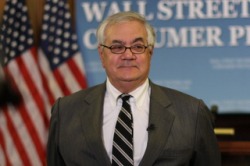Homosexuality and American Politics & Business

Congressman Barney Frank of Massachusetts
Homosexuals represent a visible minority of Americans, and are actively involved in both the business and politics of our country. Gays social issues are frequently at the forefront of elections, and as gay rights are advanced their political and social standing does as well. Gay political issues, especially gay marriage are intrinsically linked with the relationship between homosexuals and respective faiths. In addition, the portrayal and participation of homosexuals in media has allowed for homosexual related social issues to come to the front of the political spectrum.
Homosexuals represent a key marketing demographic, with a 2008 UCLA study anticipating homosexual "buying power" to reach $835 billion by 2011 (1). American business tends to favor acceptance of the homosexual community. Corporate acceptance of homosexuality trends towards the liberal. As of 2006, over half of the Fortune 500 Companies extended domestic partner health care benefits. 430 companies banned discrimination on the basis of sexual orientation, up from 294 in 2001 (2). In addition, recent research demonstrates a correlation between a country's level of tolerance (including homosexuality) and economic status, with higher level of tolerance matching up with higher economic status (3).
Gay marriage is currently one of the hottest social political issues. California's Proposition 8 Ballot Amendment to ban gay marriage in the state in 2008 raised over $83 million in campaign contributions for both sides of the cause. Donations came in from 64,000 people from all fifty states, over twenty foreign countries, setting a new record for a social policy initiative and raising more money for any ballot issue save the actual presidential election (4). Currently, five states; Massachusetts, Connecticut, Vermont, Iowa, and New Hampshire; and the District of Columbia have legalized gay marriage. A court case, Perry v Schwarzenegger, is currently challenging the constitutionality of Proposition 8, which could not only overturn the ban in California but also could overturn the Defense of Marriage Act and change the definition of marriage in the 44 other remaining states that outlaw gay marriage (5).
In addition to becoming involved in social issues, gay politicians have gained traction in recent years. The most prominent openly serving homosexual politician in United States history is Barney Frank, House Representative from Massachusetts since 1987. Frank is currently the Chairman of the House Financial Services Committee and was recently named by gay publication Out.com as the second most powerful homosexual in America after Ellen Degeneres (6).
Current United States military attitude towards homosexuals serving is composed under the “Don’t Ask, Don’t Tell” policy. The policy bars the military from revealing or investigating into homosexual behavior while also preventing homosexuals from serving openly in the military (7). However, President Barack Obama said in his 2010 State of the Union Address that he will work with Congress and the military to "finally repeal the law that denies gay Americans the right to serve the country they love because of who they are." (8)
Homosexuals represent a key marketing demographic, with a 2008 UCLA study anticipating homosexual "buying power" to reach $835 billion by 2011 (1). American business tends to favor acceptance of the homosexual community. Corporate acceptance of homosexuality trends towards the liberal. As of 2006, over half of the Fortune 500 Companies extended domestic partner health care benefits. 430 companies banned discrimination on the basis of sexual orientation, up from 294 in 2001 (2). In addition, recent research demonstrates a correlation between a country's level of tolerance (including homosexuality) and economic status, with higher level of tolerance matching up with higher economic status (3).
Gay marriage is currently one of the hottest social political issues. California's Proposition 8 Ballot Amendment to ban gay marriage in the state in 2008 raised over $83 million in campaign contributions for both sides of the cause. Donations came in from 64,000 people from all fifty states, over twenty foreign countries, setting a new record for a social policy initiative and raising more money for any ballot issue save the actual presidential election (4). Currently, five states; Massachusetts, Connecticut, Vermont, Iowa, and New Hampshire; and the District of Columbia have legalized gay marriage. A court case, Perry v Schwarzenegger, is currently challenging the constitutionality of Proposition 8, which could not only overturn the ban in California but also could overturn the Defense of Marriage Act and change the definition of marriage in the 44 other remaining states that outlaw gay marriage (5).
In addition to becoming involved in social issues, gay politicians have gained traction in recent years. The most prominent openly serving homosexual politician in United States history is Barney Frank, House Representative from Massachusetts since 1987. Frank is currently the Chairman of the House Financial Services Committee and was recently named by gay publication Out.com as the second most powerful homosexual in America after Ellen Degeneres (6).
Current United States military attitude towards homosexuals serving is composed under the “Don’t Ask, Don’t Tell” policy. The policy bars the military from revealing or investigating into homosexual behavior while also preventing homosexuals from serving openly in the military (7). However, President Barack Obama said in his 2010 State of the Union Address that he will work with Congress and the military to "finally repeal the law that denies gay Americans the right to serve the country they love because of who they are." (8)
